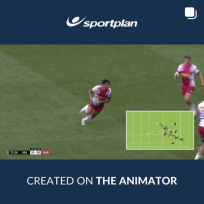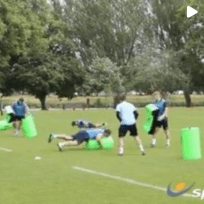Sportplan rugby has played a large role in my team's love for the game!
We have open this thread to continue the discussion on Player Empowerment started in the Coaches Hot Tip in this month's newsletter. If you missed it, here it is again. There is no doubt that if you want your team to be successful, you need the players to make decisions on the pitch for themselves. We know that if a team is used to getting the answers to problems on the field from the coach, it will mean that they will hesitate and look to the touchline before commiting to an action and that, of course, will be far too late! The coach can still influence things but once the game has started it is a fairly minimal influence, during the game it must be the players who react to situations as they happen and make decisions immediatley. Therefore, it is essential to have leaders in the team who feel confident about making decisons in the heat of the battle. They need to know that even a wrong call is better than no call. They should feel that their coach will support them in making a call and, if it was not necesarily the best decision, will help them make a better one next time without being too critical. Ideally, the leaders and decision makers will be at key positions in the team where they can communicate with other players as well as influencing play themselves. Key positions are Numbers%3A 2; 4/5; 8; 9; 10 and 15. This is often referred to as "The Spine or Backbone" of the team. This is not to say that a good captain and leader can't be in another position but if they are, for instance an 11 or 14, they will need good co leaders in the key positions to communicate their decisions during a game. To develop this spine to operate as leaders, the coach should involve these players in discussions about how the team are playing - making them feel some ownership and responsibility for the teams performance. They could also be involved in unit practises, for instance the 2 and 8 could Normal 0 false false false MicrosoftInternetExplorer4 occasionaly lead part of a line out practice, once the coach has agreed with them what the practice needs to achieve. The coach is not giving the players complete control but rather, allowing them to be involved in the process of team development. Obviously, the age and ability of your team can affect how far along this path you can go but, even with players as young as Under 8's, I have found that delegating some responsibility is a really effective way to build a cohesive and well functioning team! Let me know your thoughts on this type player empowerment. Good luck Simon
Ask a question and have it answered by Coaches from around the world and Sportplan's team of Experts.
Looking to open a bit of a debate. I was running a 'coach the coaches' course last night and I asked the candidates 'do you coach your players to run at the man? or run at space?'. There was a 50/50 split, the older coaches said 'the man', younger ones 'the space', and others who'd never played before 'both!'. What do you coach?
The law says that a forward pass is one "thrown forward" "in the direction of the opponents' goal line" Does that mean that, if the ball is passed and the receiver catches it NEARER to the opponents goal line than from where the ball was passed that the pass was forward? (Leaving to one side any other touches of the ball that might have taken place.) Maybe an example is better. Player 1 passes the ball sideways - releasing it on the 22 metre line. Player 2 (with no other player having touched the ball), running from well behind the 22 metre line, catches the ball when it has travelled sideways but the ball is now 20 metres from the opponents goal line (2 metres further forward from the place that the ball was passed). Is that a forward pass or throw forward? And if not, why not?
please how do idefine the players in the pitchie. who is the flanker, hooker, fly half etc
i need a short 10 min basic drill on decision making at the ruck any ideals.
Following the TV explanation of a referee's decision on an unsuccessful maul from a kick-off, I looked up the following rule (the latest version on the IRB site).----------------------------------------------------------------------------17.6 UNSUCCESSFUL END TO A MAUL (h) Scrum after a maul when catcher is held. If a player catches the ball direct from an opponentâs kick, except from a kick-off or a drop-out, and the player is immediately held by an opponent, a maul may form. Then if the maul remains stationary, stops moving forward for longer than 5 seconds, or if the ball becomes unplayable, and a scrum is ordered, the team of the ball catcher throws in the ball.---------------------------------------------------------------------------- It states "except from a kick-off or a drop-out", but then nowhere can I find what happens IN the case of a kick-off or a drop-out. Does anyone know the answer? The referee's decision and the explanation given on Sky was as though the exception above were not there.
plaese tell me the key factors of a miss pass
Hi guys, Thanks for everyone that answered my question on Stats!!! I am in the process of drawing up a sheet and sharing it with those that want. Next Question%3A I have come up with a few drills that I think will improve my players Vision, anticipation and decision making. I am wondering if anyone will share their ideas and process to improve these aspects of players especially VISION? I know the 2v1 and 3v2 drills ext for decision making but I want to focus more on VISION and ANTICIPATION. Any ideas??? Thanks again. Shaun
Are there any drills to encourage three-quarters to quickly return to the midfield to defend 2nd phase possession? My U11s backs get drawn into rucks amp; mauls and leave the opposition too much attacking space in midfield. Thanks
I am looking for a Day 0 type of session for American children who may have never held a rugby ball. If I move forward with a rugby exhibition/team creation in the neighborhood, I want to make sure I know how/what to teach Day 0. I'm hoping that interest is growing for touch and flag rugby due to the recent in Philadelphia between the USA Eagles and the Maori All Blacks. I was there. It was fantastic. Tickets sold out so fast, I think there will be more of these in the area. Thanks.
Looking to plan a 1.5 hour session for under 8. Do you have any advice on specific under 8 rugby union drills
My sons plays for the U9 team, his position is number ten, he was put there due to his kicking power, drop kicking accuracy, etc - I have been teaching him over time to tackle this has helped him build his confidence - what I have been noticing is the fact that when he gets the ball, he wont run - he just refuses to do anything with it...I need to find a way to encourage him the move forward with it, but nothing ever happens, now his own team mates are starting to look down at him, since he has giving the game away far to many time. Help!
How do I teach a team to make better decisions? Primarily on defense during a breakdown. How do I teach a team when to send more guys into rucks or spread out and play defense and vice versa for instance?
i am wondering i want some drill for defence and attacking
explain the ABC breadown defense drill

in more ways than one




Here are the 5 ways that you can kickstart your 2025 in the correct way with Sportplan and make this the best coaching year you have had!

How did the Modern Olympics originally begin and why are they so culturally significant today?

The Professionalisation of Netball is changing the game. Here is how it is helping to develop the sport.
Coaches from around the world look to Sportplan for coaching confidence.